We won’t say that running socks are the most important piece of running gear. No. That title belongs to running shoes. Socks might tie second with running shorts depending on your gear or experience. However, a single run with a lousy pair of socks might change your perspective forever.
Wearing an ill-fitting pair of socks can lead to an assortment of discomforts, including blisters, calluses, or just general frustration because the material bunches up in your toes as you run. That’s why in this article we’ll not just list the best running socks but also the qualities you should look for to find them.
For this article, we reviewed an assortment of informational guides to understand what qualities to look for in a running sock. We also scoured the web, including e-commerce pages and buyer’s guides, for recommendations to find the very best running socks available today.
In turn, we found a variety of options. While we picked the Balega Hidden Comfort as our best overall, all the options on this list will keep your feet dry and comfortable.
This post contains affiliate links. Outdoors.com may earn a commission when you make a purchase through these links. Thank you for your support.
The Best Running Socks
Best Overall: Balega Hidden Comfort
For the best overall, we picked the Balega Hidden Comfort Performance No Show Running Socks because while they’re highly rated for comfort, quality, and durability, they’re also affordable and therefore approachable by all levels of runners.
Balega introduced the Hidden Comfort running socks back in 2014 and they’ve endured the test of time. With nearly 21,000 reviews, they rate 4.7 stars on Amazon. Low-mileage runners — people who run approximately 20 miles a week — say their Hidden Comfort running socks have held up even after four years of use.
The Belega running socks feature large ventilation panels on the top of the sock, a high heel tab and a deep heel pocket, a plush heel-to-toe cushion, and a seamless toe. Plus, they’re constructed from a blend of synthetic moisture-wicking material.
Runner Up: Stance Run Light Crew Socks
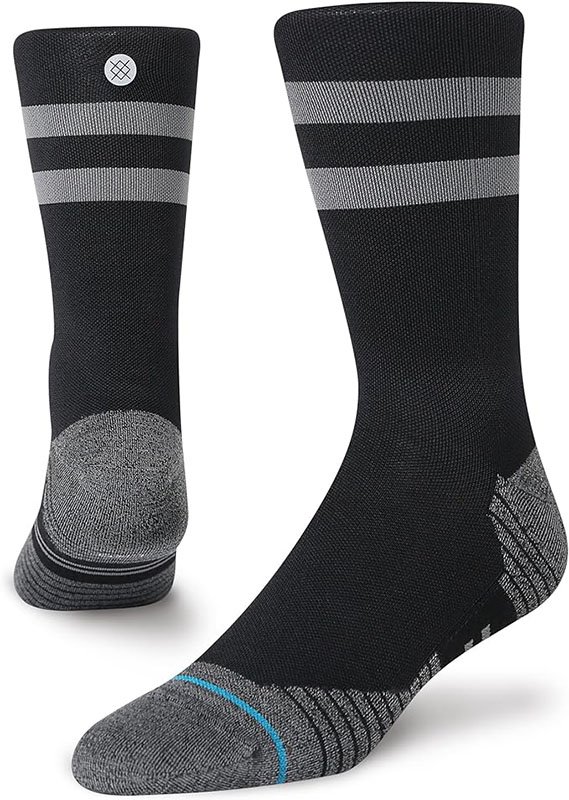
For the runner up, we picked the Stance Run Light Crew Socks. Like our best overall, the Stance crew socks are affordable and therefore approachable. However, we didn’t give them the high title because, well, they’re crew socks and that’s not everybody’s cup of tea.
The Stance Run Light Crew Socks were constructed from a nylon blend moisture wicking fabric. They feature ultralight cushioning for your toes, arch, and heel, and Stance says they’re “guaranteed for life” as they’re equipped with the company’s patented “Infiknit” high-friction weave.
In turn, reviewers love the Stance, saying they love the “compression feel” without the sock feeling too bulky and the true-to-size fit.
Best Budget: Wrightsock CoolMesh II
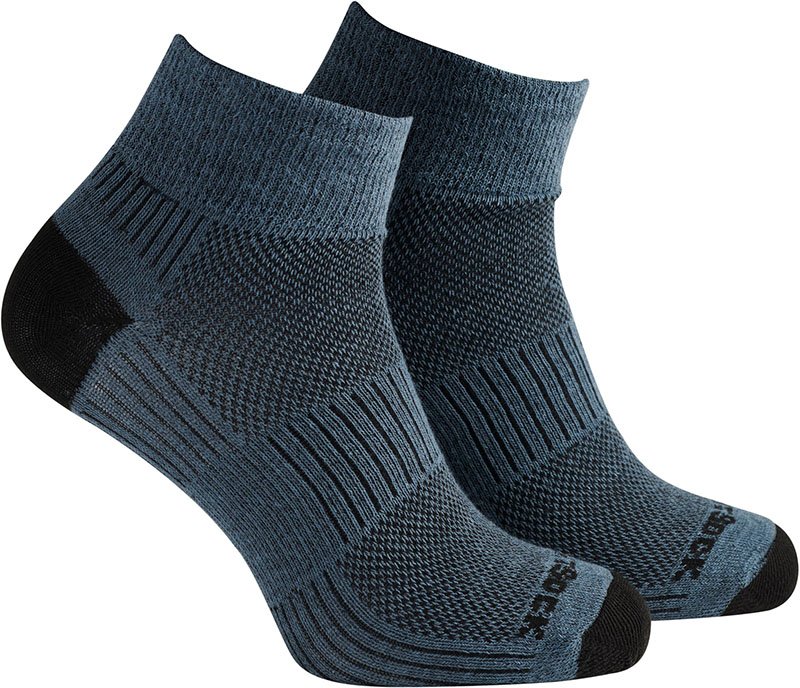
For best budget running socks, we picked the Wrightsock Cool Mesh II. While they go for the cheapest rate on this list — some $15 — they’re far from low quality.
They’re equipped with a blend of synthetic fibers and even recycled materials for moisture-wicking performance.
Reviewers also rave about the double-layer cushion because when worn for running or hiking, they rarely feel hot spots or develop blisters.
Best Toe Socks: Injinji Toe Socks
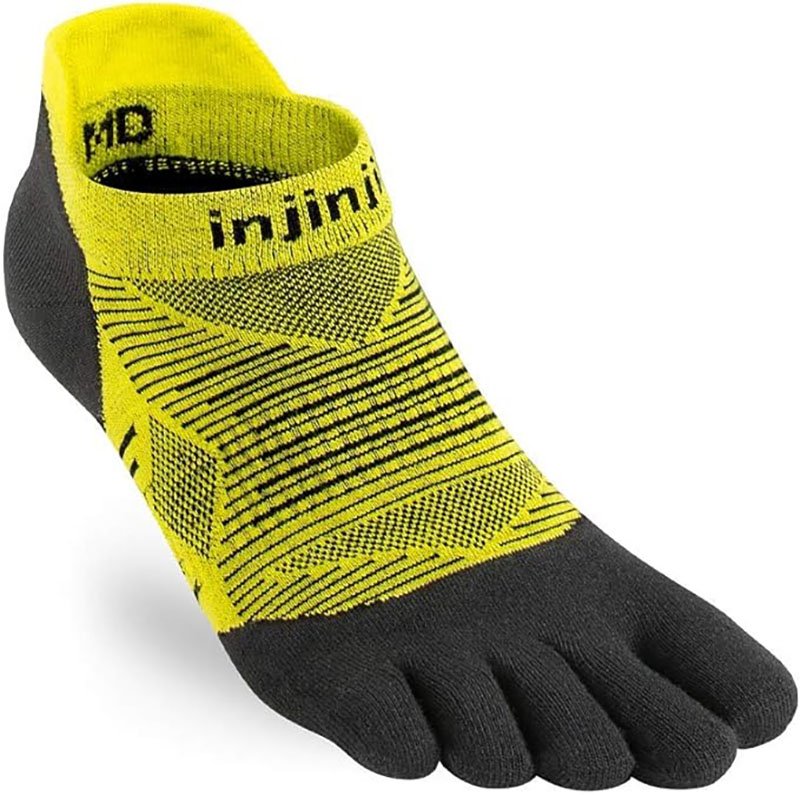
For the best toe socks, we went with the Injinji Run Lightweight No Show running socks, but was there any doubt we would? When it comes to toe socks, the brand Injinji will inevitably come up. The company calls itself “the original performance toe sock.”
Although they may look silly since we’re not accustomed to seeing socks that fit like a glove, the Injinji toe socks actually provide a lot of protection, especially during long runs. With each toe wrapped, there’s less of a chance to blister or chafe between your toes.
Reviewers give the Injinji toe socks high marks in comfort, quality, fit, and even appearance. They love how the toe socks keep their foot dry and blister-free.
Best Compression Socks: CEP The Run Compression Tall Socks 4.0
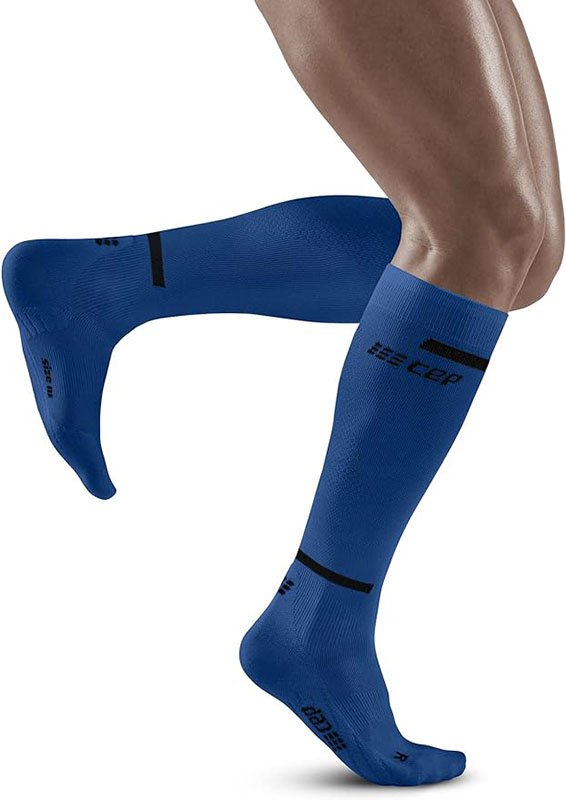
For the best compression socks, we picked the CEP Run Tall Compression Socks 4.0. The CEP running socks combine the feel standard pair of running socks with padding and moisture-wicking qualities with the performance of a compression sock.
With 20-30 mmHg compression, reviewers who wear compression socks say the CEP socks help them prolong their runs while runners recovering from injuries say they help keep things moving.
Although about double the price of a standard pair of running socks, the overall consensus is that the CEP socks are well worth the investment.
Best for Blisters: Balega Blister Resist No-Show Socks
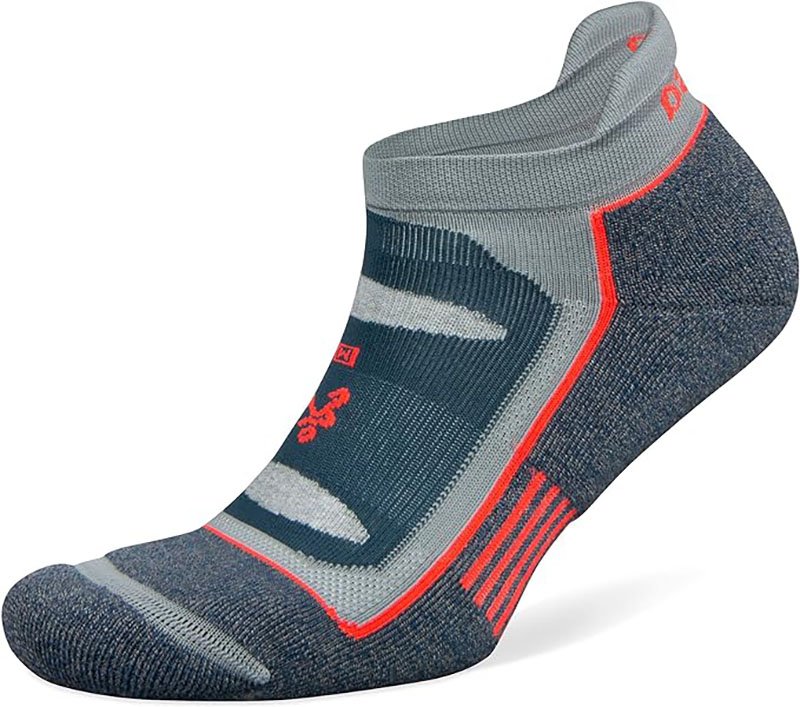
For the best anti-blister sock, we picked the Balega Blister Resist No-Show Sock. While they combine all the great qualities of a Balega running sock-like our pick for the best overall — the Blister Resist was specifically designed to prevent blisters.
Exactly how they prevent blisters is by combining natural mohair with Balega’s proprietary Drynamix material. Together, they create a soft, hollow fiber that makes the sock breathable, wicks sweat, and keeps feet cool.
As a result, the Balega gets high marks for its ability to prevent blisters.
Best for Trail Running: Swiftwick Flite XT Trail Five
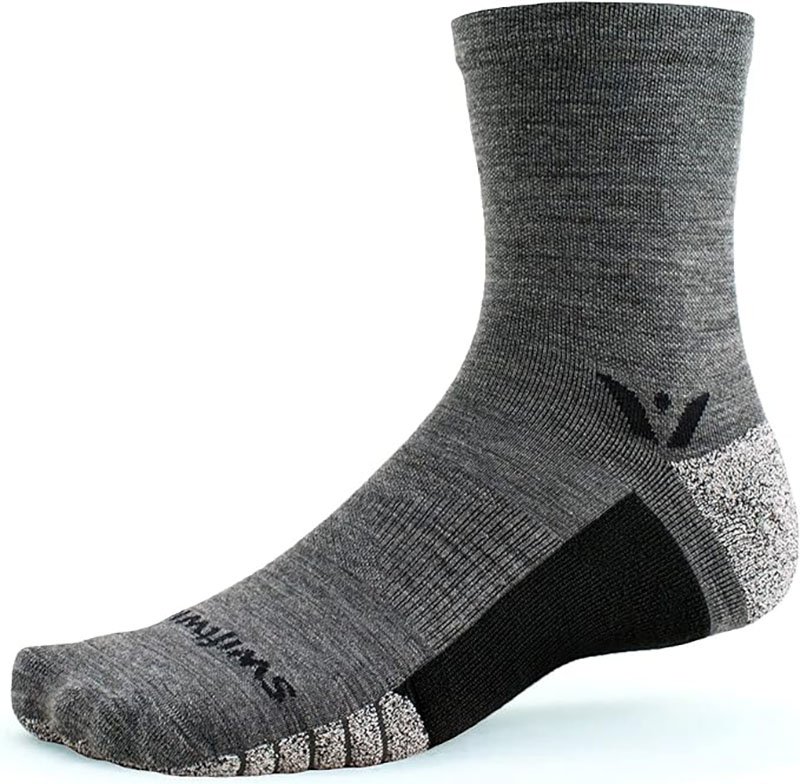
For the best trail running socks, we picked the Swiftwick Flite XT Trail Five. What makes them great trail socks is that they have overlapping qualities with hiking socks, but were adapted for the trail runner.
The Swiftback Trail Five socks feature the company’s proprietary “Grip Dry Fiber” in the heel, which provides comfort and helps keep your heel locked into the show for stability.
Additionally, it’s equipped with a synthetic and natural blend of fabrics, including Merino wool, so they wick sweat.
Best for Long Runs: Bandit Lite Run Socks
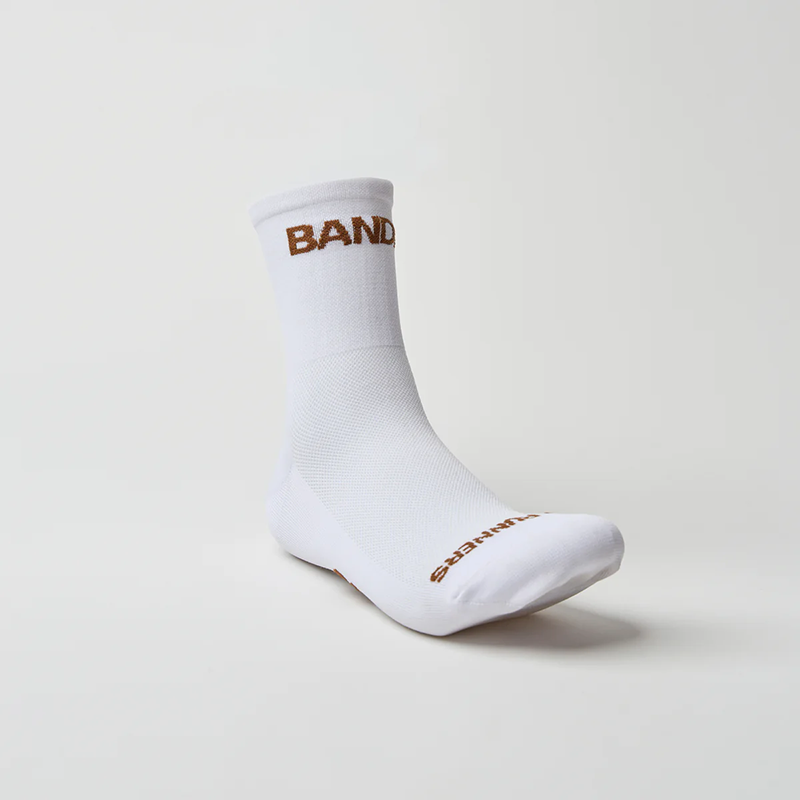
For the best running sock for long runs, we picked the Bandit Lite Run socks. These high performance socks deliver all the qualities you want in a running sock, such as breathability, support, and cushioning during long-distance runs.
The Brooklyn-based Bandit weaved these socks using “breathable honeycomb mesh crowns,” meaning it has a strong yet breathable pattern. Additionally, the company uses a synthetic blend of fabrics, including spandex for some light compression above your ankle.
While there aren’t too many reviews of the Bandit Lite Run socks, what sold us was the fact that they’re the preferred socks of ultrarunner Paul Johnson during his world-record attempt at running across the U.S.
How to Find the Best Socks for Running
Like all undergarments, running socks provide a layer between your skin and another article. In this case, your foot and your shoe. A good quality running sock will help prevent blisters and keep your feet dry and comfortable during a run.
When it comes to running socks, there’s not really that much to think about. All you really need to do is know your size and consider materials, length, and cushion. That’s not too bad, right? Right? Right?!
Materials
Looking at materials is a great first step in finding the best running socks because materials can really make or break the design.
Most experts say right off the bat to avoid cotton socks. The reason is the natural fiber absorbs moisture, and moisture and friction can lead to blisters and sores and eventually trench foot.
Instead of 100% cotton, experts recommend wearing socks made from synthetic fibers like nylon, polyester, and spandex; other natural fibers like merino wool; or a blend of natural and synthetic fibers.
Merino Wool
One thing to note is that if you do any sort of online research, you’ll see merino wool socks. The reason why they’re so popular is that it has a host of positive qualities. Experts say using the fiber results in a breathable sock that’s both moisture-wicking and anti-bacterial. They’ll also help keep your feet warm in the winter and your feet cool in the summer. Weird.
Sock Height
Unless you’re buying compression socks to support your calf or you want knee-high socks, sock height is a matter of preference. Some prefer no-show socks to show off their legs while other runners like their socks slightly higher to protect the back of their heel.
Still, some argue your trail running socks should be tall because they’ll protect your legs from the brush, but you can take it or leave it. Nonetheless, socks come in four different lengths, including no-show, ankle, quarter, and crew.
Sock Heights
- No-show socks are designed to sit just below the ankle so no one can see them above your shoe.
- Ankle socks cover just above or slightly below your ankle bone.
- A quarter-length sock covers just above the ankle bone.
- And, crew socks stop in the middle of the calf.
Sock Cushioning
When comes to cushioning, you have to ask yourself if you want to wear thicker socks or thinner socks.
However, when experts compare a thin sock with a thicker sock, they outline the advantages and disadvantages as a matter of preference rather than performance.
Thicker socks will provide more cushion and the extra material can take up more space inside of your shoe, so your foot slides less, which is especially helpful if your shoe fits a little loose.
A thinner sock might be more comfortable if you engage in physical activities that don’t involve running or walking quickly, or if you need to wear warm outer layers like ski boots.
Sock Cushioning Levels
- No cushion socks contain no additional padding.
- Light cushion socks feel thicker underfoot, which you might feel inside your shoe.
- Medium cushion socks provide extra padding underfoot, which you’ll feel inside of a shoe.
- Socks with max cushion are immediately noticeable as the padding is thick and plush.
It’s also worth noting that sock thickness is not always consistent. Some parts of the sock will be thicker than others for targeted compression. These are often parts of the foot that strike the ground and in turn, wear out the sock.
FAQs About Running Socks
Do running socks make a difference?
Running socks can make a difference if you’re a serious runner like a competitive runner. They’re also helpful if you like running and care about performance or comfort. Depending on the design, running socks will increase ventilation, wick moisture away from your skin, and protect vulnerable parts of your foot.
Should running socks be thick or thin?
The thickness of your running socks depends on preference and time of year. Some runners may prefer thick cushioning in certain parts of their socks, others may want thicker socks to keep their feet warm, and others still may want thinner socks because of the way their running shoes fit.
What is the difference between running socks and regular socks?
Running socks or athletic socks are designed to provide comfort and protection in specific areas of the foot. Whereas, a regular sock will provide consistent thickness and cushioning throughout.
Why do runners not wear socks?
Is that true? Just like your underwear, running socks provide a layer of protection for not just your feet but your running shoe as well. Without socks, your shoes will absorb all the moisture and all of the impact during your run.
When should you throw out running socks?
Much like running shoes, experts suggest getting rid of running socks every 300 to 500 miles. However, you might not need to know the mileage because you’ll start seeing holes, thinning, fading, and loss of elasticity.
Are tight socks bad for running?
By tight socks, do you mean compression socks? If that’s the case, compression socks will help with circulation, meaning they’ll help increase blood flow through your ankles and legs. However, if they’re too tight, they will do the opposite — cut off circulation. The rule of thumb is compression socks should feel tight but not uncomfortable.
The Best Running Socks
For our list of the best running socks, we listed the Balega Hidden Comfort as the best overall because of their overall high marks and availability. If you want something different but still great performance socks, we recommend the Injinji Toe Socks. And for high end performance and long distance running, we suggest the Bandit Lite Run Socks.





